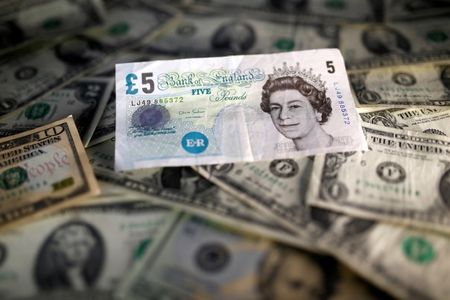Dollar edges higher, sterling slips ahead of BOE meeting
2024.06.20 05:41

Investing.com – The U.S. dollar edged higher Thursday, while sterling slips lower ahead of the latest Bank of England’s policy-setting meeting.
At 04:00 ET (09:00 GMT), the Dollar Index, which tracks the greenback against a basket of six other currencies, traded 0.2% higher at 105.122, edging towards last week’s one-month top of 105.80.
Dollar pushes higher after holiday
The U.S. currency pushed higher Thursday after the return of traders following a holiday in the United States.
The U.S. economic data slate includes figures and data later in the session, as investors look for more clues towards when the Federal Reserve will start cutting interest rates.
A series of Fed officials have expressed caution about expecting rate cuts too soon, seeking more evidence that inflation has been tamed before the central bank would agree to easing monetary policy.
“It appears that there is simply not enough confidence in the data to trigger a dovish turn in communication, but markets’ forward-looking nature means that data remains more important than Fed speakers, and the 50bp of cuts priced in by year-end reflects the cautious optimism on disinflation,” said analysts at ING, in a note.
Sterling slips ahead of BOE meeting
fell 0.1% to 1.2699, ahead of the Bank of England’s latest policy-setting later in the session.
The central bank is widely expected to keep interest rates unchanged, even after data released earlier this week showed that annual fell to 2.0%, in line with its medium-term target.
This marked a sharp decline from the 41-year high of 11.1% reached in October 2022, but wage growth and underlying pricing pressure remain a concern for the central bank.
fell 0.2% to 1.0718, with political jitters in the region continuing to weigh on the single currency.
The European Commission said on Wednesday that France and six other countries should be disciplined for running budget deficits in excess of EU limits, with deadlines for reducing the gaps to be set in November.
This comes after French President Emmanuel Macron called a snap election after poor results for his party in European Parliament elections, throwing the EU’s second-biggest economy into political turmoil.
spared 0.7% to 0.8901 after the reduced its key interest rate by 25 basis points, continuing a rate-cutting cycle after March’s reduction.
The decision had been finely balanced, given a recent rebound in economic growth and a break in the trend of gently falling inflation in Switzerland.
Yen remains weak
In Asia, traded 0.2% higher to 158.44, trading at a one-month high with the yen continuing to show weakness after the Bank of Japan took a relatively dovish stance regarding its bond purchases at its recent policy meeting.
traded 0.1% higher at 7.2604, with the Chinese yuan remaining under pressure amid doubts about the strength of the country’s economic recovery.








